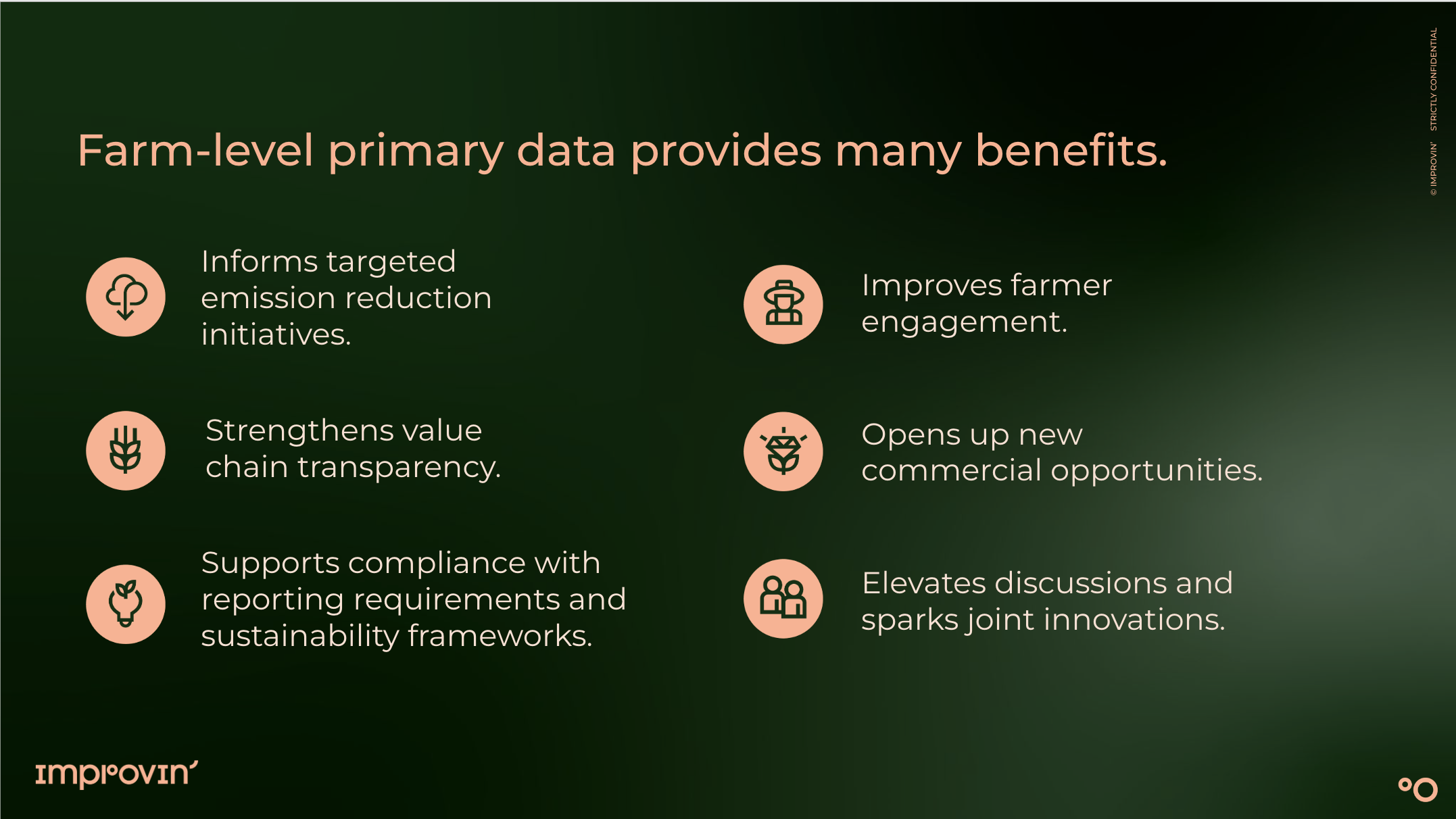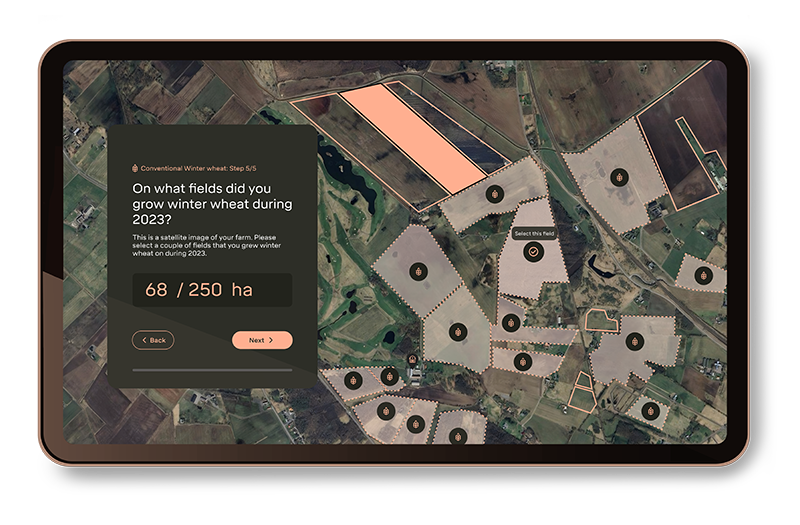Reducing the workload of farm-level primary data collection.
Key takeaways
Primary data is essential for accurate carbon accounting and effective Scope 3 emission reductions in agriculture.
Farm-level primary data enables value chain transparency and supports compliance with sustainability reporting standards and frameworks.
Most primary data collection methods are resource-intensive and hard to scale.
With the right tools, operationalizing farm-level primary data collection becomes feasible, unlocking stronger supply chain relationships and commercial opportunities.
Improvin’s Operating System simplifies data entry and harmonization with streamlined data, pre-populated information and incremental reporting.
Even companies without direct access to farmers can leverage Improvin’s solutions.
What is primary data?
The Greenhouse Gas Protocol defines primary data as data related to specific activities in the reporting company’s value chain, provided by suppliers or other value chain partners.
In the agri-food industry, and the context of upstream Scope 3 farm-level emissions, the concept of primary data usually refers to information gathered from the farmers regarding their operations and practices – such as yields, crop rotations, soil health, tilling, and fertilizer and pesticide application rates.
Secondary data, per GHG Protocol’s definition, is data reflecting industry averages or regional averages, sourced from e.g. published databases, government statistics or industry associations, or proxy data, i.e. estimations based on other activities in the value chain.
In the context of Scope 3 agricultural emissions, secondary data does not capture the specific conditions, practices or operations unique to individual farms.
In general, the GHG Protocol advises companies to use high-quality primary data for carbon accounting of high-priority Scope 3 activities. For assessing the data quality, the GHG Protocol suggests using indicators such as technological, temporal and geographical representativeness, reliability of the data sources as well as statistical representativeness of the data.
The critical role of farm-level primary data in the agri-food industry.
Agriculture is a major contributor to Scope 3 emissions for agri-food companies, usually accounting for 70-90% of their total emissions.
At the same time, agriculture is also a critical lever for achieving large-scale emissions reductions. In order to reduce the emissions, data used for the transition strategies must reflect actual production conditions.
Compared to many other industries, primary data in agriculture is particularly important as farm-level data will vary significantly from year to year due to crop rotations and changing growing conditions. A farmer supplying a particular crop to a buyer one year will likely not cultivate the same crop from the same field the following season.
Therefore, understanding the actual farming practices behind the sourced volumes is an essential starting point for change for any agri-food company.
Using farm-level data to inform decision-making drives targeted emissions reductions and provides a reliable benchmark for measuring progress.
There are also many other benefits to using farm-level primary data:
Control and transparency.
Farm-level primary data enables companies to calculate the sustainability impacts of their commodities, such as carbon footprints and biodiversity impacts, and communicate these insights to their buyers. This enhances value chain transparency and gives the sourcing companies control over the unique value they provide.
Reporting compliance.
Using farm-level primary data in sustainability reporting supports compliance with sustainability directives, such as the EU’s Corporate Sustainability Reporting Directive, and it enables best practices for many sustainability frameworks and certifications, such as SAI Regenerative Agriculture.
Improved farmer engagement.
Engaging with farmers through primary data allows companies to strengthen the relationships with their farmer community by discussing sustainability insights, rewarding farmer excellence, building tangible programs, tracking progress and supporting farmers in their transition to sustainable practices.
New commercial opportunities.
With farm-level primary data, farmers can differentiate their products in the market by highlighting their practices. Buying companies, in turn, can position these volumes as low-carbon commodities, adding value across the supply chain.
Collaborative transformation.
Access to granular farm-level data fosters collaboration within and beyond the food value chain. Primary data elevates discussions among companies and can spark joint initiatives, innovations and investments that support farmers - see one example here.
Image: Farm-level primary data provides many benefits.
The operational challenge.
While primary data is crucial for supply chain traceability, farmer engagement, emission reductions and regulatory compliance, collecting and utilizing it has posed a significant operational challenge for agri-food companies, especially those with large, international supply chains.
Most farm-level data collection efforts have been rather manual with data gathered into spreadsheets or internal databases.
These methods are resource-intensive and can raise concerns about data security, ownership and harmonization. Such methods have also caused increased frustration among farmers.
Farmers are not a homogeneous group; their operations vary considerably depending on their region, scale, cultivated crops, soil type, culture and demography, for example, digital maturity.
Some farmers already track their practices across multiple systems, including Farm Management Systems (FMSs), while others may prefer pen and paper.
When reporting requests then arrive, often presenting a blank canvas and asking for data that already exists elsewhere, farmers can feel overwhelmed or demotivated.
Manual reporting processes also lack feedback loops for farmers, who receive no validation, insights or results.
Altogether, these challenges highlight the need for a scalable digital system to streamline and harmonize the collection and utilization of farm-level primary data in a GDPR-compliant way.
How to reduce the workload of collecting farm-level primary data.
Improvin’s Operating System scales data collection for agri-food companies and simplifies data entry for farmers.
The system streams data automatically from sources such as farmers’ FMSs and buyers’ ERP systems and utilizes advanced modeled data based on satellite imagery, soil and weather data.
When reporting, farmers mostly validate information rather than having to enter all details manually.
Image: Example view from Improvin’s Operating System.
Improvin’s system also encourages reporting in stages, focusing on a tailored set of most impactful questions first to ensure key information is collected from a broad farmer base while requiring minimal effort on the farmers’ end.
All sustainability insights derived from the farm-level information are connected to the sourcing contracts and sourced volumes, making them actionable and traceable to the field level.
In addition to delivering sustainability insights to buyers, Improvin’ offers farmers valuable feedback on their carbon footprint and performance compared to industry averages.
These feedback loops help farmers see the value of the reporting process.
Collecting farm-level data without direct farmer relationships.
Many companies in the agri-food industry source commodities from cooperatives or purchase ingredients that have been processed by intermediaries, such as mills.
When direct relationships with farmers are limited, collecting farm-level information can be especially challenging.
Improvin’ offers a solution that enables companies to engage with their suppliers in their value chain and jointly invite farmers to report agricultural data, even when the sourcing company itself is positioned further down the value chain.
Reach out to our team to learn more about this solution.
Summary.
Collecting farm-level primary data is essential for agri-food companies to accurately calculate Scope 3 emissions, drive targeted emissions reductions and achieve sustainability goals.
However, manual approaches to farm-level data collection are often resource-intensive, limited in scalability, sensitive to data security and frustrating for the farmers.
Improvin’s Operating System addresses these challenges by integrating data from multiple sources, pre-populating key information and introducing feedback loops that benefit both companies and farmers.
The GDPR-compliant solution enables companies to streamline data collection, foster collaboration and support farmers in the transition to sustainable practices, regardless of the company’s position in the food value chain.
While gathering farm-level primary data may seem challenging to operationalize, the right tools allow companies to connect sustainability values with sourced commodities, future-proofing the sourcing operations and strengthening relationships across the whole value chain.


